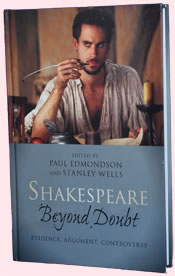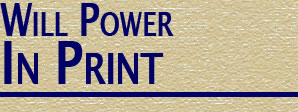Beyond Even Unreasonable Doubt
Book Establishes Shakespeare's Authorship
Shakespeare Beyond Doubt: Evidence, Argument, Controversy
Edited by Paul Edmondson and Stanley Wells (Cambridge University Press, 2013)
 Here's my new theory regarding the authorship of William Shakespeare's plays. The future-seeing Shakespeare, born and raised the son of a glover in Stratford-upon-Avon and eventually proprietor of two of London's most successful theaters, knew his writing of the plays would some day be doubted and that naysayers would look to his very text for contextual clues. So, he mimicked his future pretenders by portraying them in his plays: Frances Bacon as Holofernes in Love's Labour's Lost, Christopher Marlowe as Pistol in Henry IV Part Two and Henry V, and Edward de Vere (17th Earl of Oxford) as Bottom playing Pyramus in A Midsummer Night's Dream.
Here's my new theory regarding the authorship of William Shakespeare's plays. The future-seeing Shakespeare, born and raised the son of a glover in Stratford-upon-Avon and eventually proprietor of two of London's most successful theaters, knew his writing of the plays would some day be doubted and that naysayers would look to his very text for contextual clues. So, he mimicked his future pretenders by portraying them in his plays: Frances Bacon as Holofernes in Love's Labour's Lost, Christopher Marlowe as Pistol in Henry IV Part Two and Henry V, and Edward de Vere (17th Earl of Oxford) as Bottom playing Pyramus in A Midsummer Night's Dream.
Shakespeare Beyond Doubt: Evidence, Argument, Controversy, a collection of scholastic essays edited by Paul Edmondson and Stanley Wells, does more than debunk anti-Stratfordian conspiracy theories (anti-Stratfordian being the collective term for those who believe Shakespeare of Stratford-upon-Avon could not have written the works attributed to him). The book illustrates that not only could a simple glover's son write all those plays, he most undoubtedly did. And I place emphasis on the phrase in the title, "beyond doubt." As a journalist, it is in my training to never take anything for absolute certainty, and so I've always maintained a 99 percent certainty that Shakespeare of Stratford-upon-Avon wrote all those plays and poems.
Well, now I am 100 percent certain.
Over the years, scholars have, at most, merely pooh-poohed the anti-Stratfordian theorists. The conspiracists' lack of scholastic rigor—indeed, their utter disregard for scholarship—simply hasn't merited real scholars' time. Why waste effort on such obvious hogwash? However, in the vacuum of any concerted rebuttal, the myths took hold and spread, growing to general prevalence in the Internet age. The Shakespeare Birthplace Trust finally decided to fight back. It set this book in motion in the run-up to the 2011 release of Roland Emmerich's film Anonymous, a movie presenting a loutish Shakespeare as a front for Oxford. The Birthplace Trust realized that Anonymous and its accompanying school lesson-plan campaign threatened to establish for the general public unreasonable doubt in Shakespeare and shove aside real scholarship (and, frankly, it's devoted biographical scholarship rather than fantastical flights of interpretation that gives us true insights into Shakespeare's works).
Notably, the editors make their case with prosecutorial skill. They first call to the stand essayists who establish solid alibis for the usual suspects put forth as the real writers of Shakespeare. Scholars specializing in those individuals (Alan Stewart on Bacon, Charles Nicholl on Marlowe, Alan H. Nelson on Oxford) use historical record to, step by step, debunk claims that Bacon was involved in an anti-Elizabeth conspiracy, that Marlow was not really killed in a tavern, and that Oxford would have had the wherewithal to write the plays or sonnets.
The next section of the book delves into Shakespeare as author. If nothing else, Shakespeare Beyond Doubt in mere pages provides a rich biographical survey of Shakespeare, rich because the historical record is more plentiful than anti-Stratfordians like to admit. This book tackles head-on the ignorant claim that so little was written about Shakespeare in his time; more was written about him than just about any other non-noble individual, a remarkable amount of mention for a private citizen in his time.
In his essay, "Shakespeare As Collaborator," John Jowett provides a revealing window into the method of playwriting from 1590 to 1610, the nature of producing plays, and the proclivity of collaboration. In fact, Shakespeare did not write all of Shakespeare; he clearly had collaborators help him out on occasion (especially early and late in his career), and he assisted other playwrights. Jowett uses the manuscript of Sir Thomas More to illustrate how Shakespeare worked in collaboration with his colleagues.
David Kathman in "Shakespeare and Warwickshire" portrays the Stratford where Shakespeare grew up and puts forth what I have long held to be true: that the man who wrote all those plays could be nothing other than a glover's son and wool merchant from Warwickshire. "What Does Textual Evidence Reveal about the Author?" by James Mardock and Eric Rasmussen uses textual evidence of the plays to reveal not so much the personal biography of the playwright but his curriculum vitae as a professional theater man. Only a person who worked in the theater would have inserted so many allusions to acting and stagecraft in his plays.
Carol Chillington Rutter in "Shakespeare and School" delves into the kind of education Shakespeare would have received at Stratford's grammar school. We have no proof that Shakespeare attended the school, though as the son of a town official he likely would have, but Rutter provides an Elizabethan Who's Who of Stratford grammar school graduates (including some who became members of the court), indicating the high level of education the school offered. However, the enlightenment in this chapter is much more than how the curriculum was sufficient to give Shakespeare the kind of language skills he would need to write all those great plays; more revealing, the curriculum and the way it was learned by students seems to have provided the manner of composition Shakespeare employed. It's no wonder that so many of the age's most popular and successful post-Marlow playwrights in addition to Shakespeare were not college educated or of noble stock. Such schools turned Shakespeare into Shakespeare, Ben Jonson into Jonson, et al.
The book's dramatic highlight—the point where Shakespeare Beyond Doubt slams home its case—is the centerpiece essay "Authorship and the Evidence of Stylometrics" by MacDonald P. Jackson, which surveys several modern stylistic studies, all using different methodologies yet all coming to strikingly similar conclusions about which "Shakespeare" plays were written by Shakespeare, which contain another hand (he wrote 90 percent of the canon attributed to him), and which non-"Shakespeare" plays have his hand. These same studies are then applied to the anti-Stratfordian candidates (Bacon, Oxford, and Marlowe's published plays and poems), concluding that they did not have even a pinky, let alone a hand, in the "Shakespeare" plays, except Marlowe in plays written before his death, but none after.
These stylistic studies conclude that the person who wrote Hamlet is "Hand D" who wrote the mob scene in Sir Thomas More, which is in manuscript form. Handwriting analyses conclude that the person who wrote that scene in Sir Thomas More is the same person who penned legal documents and signed his name as William Shakespeare of Stratford. You can supply the ergo.
Shakespeare Beyond Doubt's final portion covers the cultural phenomenon of anti-Stratfordian conspiracy theories. The highlight of this section is Douglas M. Lanier's essay on Anonymous. Going beyond the utter silliness of the movie and its plot, Lanier describes how the movie's very argument implodes on itself. Emmerich's Oxford wants only to advance the rights of the noble class; and yet, the plays he writes encompass the voice of the common man: a common man like Shakespeare. Hmmm. In the book's final essay, Edmondson takes on the campaigning fervor of the anti-Stratfordians, which, he notes, is the magnified efforts of few people with any applicable credibility. He finds humor in their labeling Shakespeare authorship as a conspiracy perpetuated by a greedy Shakespeare industry; Edmondson hints that he would like to see some of the wealth he and his fellow scholars are purportedly hording.
Some essays wander off into scholastic esoterica, but for the most part, Shakespeare Beyond Doubt is an enthralling read. Even if you are an ardent Stratfordian, you will appreciate the biographical data and textual insights into Shakespeare, the Warwickshire lad who grew up to be a successful theater pro. You also now have the ammunition to fire back at those who would naysay how a common man—someone like you or me—could use his experience, his learning, his intellectual sweat, and a shot of genius to write all those great plays.
If you are an anti-Stratfordian, I doubt you will want to read Shakespeare Beyond Doubt. It has too much truth, and you can't handle the truth.
Eric Minton
December 26, 2013
Comments
Dear Mr. Minton,
You don't know me, so I don't know how you can be expected to know my capacity for handling whatever you construe to be the truth. But making assumptions based on no data is a common Stratfordian error.
Linda Theil
December 26, 2013
Eric, dude,
Excellent review of Shakespeare Beyond Doubt: Evidence, Argument, Controversy. Now I simply have to buy it and read it. I'm with you 100 percent. There will always be the conspiracy theorists; seems to me these people are either envious of genius they cannot fathom or simply have nothing important to do with their time. Anyway, thanks for a terrific review.
Thanks too for the review of Man in a Case, which is coming to Boston the last week of February (ArtsEmerson: https://artsemerson.org/).
We are very excited to see Baryshnikov, but who wouldn't be really? (I bet the anti-Stratfordians believe it's a body double or one of those new humanoid robots and not really him on stage!)
Michael Estabrook
December 28, 2013
Comment: e-mail editorial@shakespeareances.com
Start a discussion in the Bardroom



 Find additional Shakespeareances
Find additional Shakespeareances